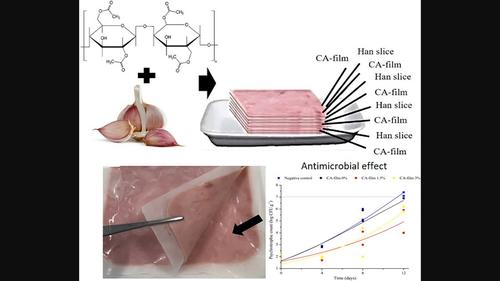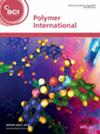Incorporation of garlic (Allium sativum) essential oil into cellulose acetate films: effect on the preservation of sliced cooked ham
Márcia Teixeira Bittencourt, Clara Suprani Marques, Tarsila Rodrigues Arruda, Edimar Aparecida Filomeno Fontes, Paulo Rogério Fontes, Marali Vilela Dias, Taíla Veloso de Oliveira, Nilda de Fátima Ferreira Soares
求助PDF
{"title":"Incorporation of garlic (Allium sativum) essential oil into cellulose acetate films: effect on the preservation of sliced cooked ham","authors":"Márcia Teixeira Bittencourt, Clara Suprani Marques, Tarsila Rodrigues Arruda, Edimar Aparecida Filomeno Fontes, Paulo Rogério Fontes, Marali Vilela Dias, Taíla Veloso de Oliveira, Nilda de Fátima Ferreira Soares","doi":"10.1002/pi.6591","DOIUrl":null,"url":null,"abstract":"<p>Garlic essential oil (GEO) has been recognized as a natural antimicrobial agent with a broad spectrum of action that can be associated with polymeric sustainable matrices to provide active packaging capable of improving the preservation of ready-to-eat meat products. In this sense, the present study aimed to evaluate the effect of cellulose acetate (CA) films incorporated with GEO on the growth of spoilage microbial groups (psychrotrophic (PSY) and lactic acid bacteria (LAB)) and physicochemical characteristics (pH, acidity index, color and index of thiobarbituric acid) of vacuum-packed cooked sliced ham. Four treatments were evaluated (no film, CA-film without GEO, CA-film with 1.5% of GEO and CA-film with 3% of GEO, applied as interfold packaging) over time (12 days). There was a significant reduction (<i>ca</i> 2.0 log cycle) in PSY and LAB growth when the active films were applied between the ham slices. Also, the lag phase of PSY was extended from around 2 to 6 days, which might positively impact the product's shelf life. However, the active films showed no significant effect on the food physicochemical characteristics. Therefore, the active CA-films incorporated with small amounts of GEO could be an interesting alternative to reduce the impact of microbial spoilage on sliced cooked ham. © 2023 Society of Industrial Chemistry.</p>","PeriodicalId":20404,"journal":{"name":"Polymer International","volume":"74 1","pages":"20-27"},"PeriodicalIF":3.6000,"publicationDate":"2023-11-15","publicationTypes":"Journal Article","fieldsOfStudy":null,"isOpenAccess":false,"openAccessPdf":"","citationCount":"0","resultStr":null,"platform":"Semanticscholar","paperid":null,"PeriodicalName":"Polymer International","FirstCategoryId":"92","ListUrlMain":"https://scijournals.onlinelibrary.wiley.com/doi/10.1002/pi.6591","RegionNum":4,"RegionCategory":"化学","ArticlePicture":[],"TitleCN":null,"AbstractTextCN":null,"PMCID":null,"EPubDate":"","PubModel":"","JCR":"Q2","JCRName":"POLYMER SCIENCE","Score":null,"Total":0}
引用次数: 0
引用
批量引用
Abstract
Garlic essential oil (GEO) has been recognized as a natural antimicrobial agent with a broad spectrum of action that can be associated with polymeric sustainable matrices to provide active packaging capable of improving the preservation of ready-to-eat meat products. In this sense, the present study aimed to evaluate the effect of cellulose acetate (CA) films incorporated with GEO on the growth of spoilage microbial groups (psychrotrophic (PSY) and lactic acid bacteria (LAB)) and physicochemical characteristics (pH, acidity index, color and index of thiobarbituric acid) of vacuum-packed cooked sliced ham. Four treatments were evaluated (no film, CA-film without GEO, CA-film with 1.5% of GEO and CA-film with 3% of GEO, applied as interfold packaging) over time (12 days). There was a significant reduction (ca 2.0 log cycle) in PSY and LAB growth when the active films were applied between the ham slices. Also, the lag phase of PSY was extended from around 2 to 6 days, which might positively impact the product's shelf life. However, the active films showed no significant effect on the food physicochemical characteristics. Therefore, the active CA-films incorporated with small amounts of GEO could be an interesting alternative to reduce the impact of microbial spoilage on sliced cooked ham. © 2023 Society of Industrial Chemistry.
大蒜(Allium sativum)精油掺入醋酸纤维素薄膜:对熟火腿切片保存的影响
大蒜精油(GEO)已被公认为具有广泛作用的天然抗菌剂,可与聚合物可持续基质相关联,提供能够改善即食肉制品保存的活性包装。因此,本研究旨在评价含GEO的醋酸纤维素(CA)膜对真空包装熟切片火腿腐坏菌群(psychrotrophic (PSY)和乳酸菌(LAB))生长和理化特性(pH值、酸度指数、颜色和硫代巴比妥酸指数)的影响。随着时间(12天)的推移,评估了四种处理(无膜、不含GEO的ca膜、含1.5% GEO的ca膜和含3% GEO的ca膜,作为折叠包装)。当活性膜应用于火腿片之间时,PSY和LAB的生长显著降低(约2.0对数周期)。此外,PSY的滞后期从2天左右延长到6天,这可能会对产品的保质期产生积极影响。活性膜对食品理化特性无显著影响。因此,加入少量GEO的活性ca膜可能是一种有趣的替代方法,可以减少微生物对切片熟火腿的腐败影响。©2023工业化学学会。
本文章由计算机程序翻译,如有差异,请以英文原文为准。







